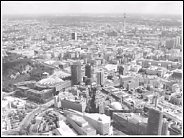 |
|
City Governance in Berlin |
Berlin, having 3.4 million inhabitants, is
the largest city in Germany. The two parts of the city have
been re-united in terms of infrastructure and buildings
during the last twelve years, but socially and culturally
they are still quite different. Moreover, the city has huge
budgetary problems mainly caused by the enormous restructuring
process of the past decade.
 Berlin
will now concentrate on improving the existing infrastructure,
and focus on its assets that lie in its tradition as an
international city of culture and science, communication
and the media. Berlin wants to become a city where all residents,
rich and poor, old and young, nationals and ethnic minorities
like to live and work; a place offering affordable housing,
jobs, cultural and educational facilities, commercial and
leisure areas, and public space, squares, and parks, places
where people can meet. Berlin
will now concentrate on improving the existing infrastructure,
and focus on its assets that lie in its tradition as an
international city of culture and science, communication
and the media. Berlin wants to become a city where all residents,
rich and poor, old and young, nationals and ethnic minorities
like to live and work; a place offering affordable housing,
jobs, cultural and educational facilities, commercial and
leisure areas, and public space, squares, and parks, places
where people can meet.
Our guiding principles are:
- The inner city has to be strengthened as a forum where
people live and work. A social and functional mixture
in the central parts of Berlin and its boroughs is the
basic requirement for viable urban development.
- Inner city green and open spaces are the yardstick
for the quality of urban life. We will further develop
our 45% of green space.
-
 The
civilisation of road traffic or more mobility with less
traffic is one of Berlin's main political targets. The
city's attractiveness will increase further if more people
use the excellent public transport network, go by bicycle
or on foot. An efficient parking lot management in the
centre is also part of the strategy. The
civilisation of road traffic or more mobility with less
traffic is one of Berlin's main political targets. The
city's attractiveness will increase further if more people
use the excellent public transport network, go by bicycle
or on foot. An efficient parking lot management in the
centre is also part of the strategy.
- The promotion of initiative and social responsibility
through dialogue. The situation in some of boroughs began
to deteriorate in the 90s due to deindustrialisation and
huge structural changes. To solve the problems in 17 areas,
mainly in the old districts, we have launched a programme
with new integrated problem-solving strategies involving
self-help, private initiative, and collaboration by the
people concerned, thus stimulating and supporting essential
local development resources. It is called "Social
City". Neighbourhood management is a crucial tool
in implementing this new programme.
The different measures are part of an urban
policy which is help to improve the economic situation.
We think that in the long run a city taking care for attractive
living and working conditions will also be attractive for
the location of firms.
|